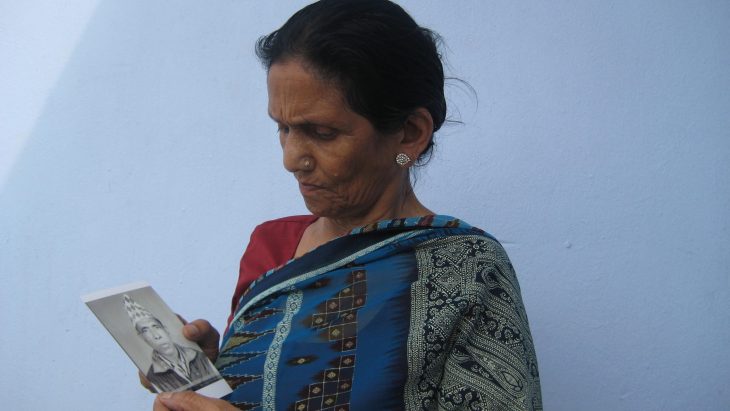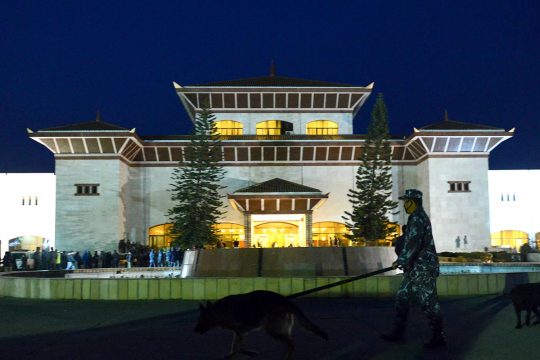August 30th marks the International Day of the Disappeared, an opportunity for the world to remember those missing and disappeared during conflict. In Nepal there is little discussion about the more than 1,500 Nepalese who disappeared during the ‘People’s War’ (1996-2006).
Who were they? Why were they forcibly disappeared? Where are they now? Their relatives still wait for answers, living in a state of protracted ambiguity and anguish. They live with the memory of their missing loved ones, grieving their loss while holding out hope that their search will not be in vain. These challenges are further compounded by a government that, despite its direct role in perpetrating disappearances during the conflict, is not serious in its efforts to aide these families, and fails to consider victims’ agendas and their right to truth and justice.
The Commission for the Investigation of Enforced Disappearance (CIEDP) was formed in early 2015, without provision to establish enforced disappearance as a crime. This meant that even if the commission could identify perpetrators of disappearances, the state of Nepal has no legal authority to try and punish those who committed these acts. Despite this, thousands of families have gone to the commission and registered the disappearance of their loved ones, naming the alleged perpetrators and challenging the state to reveal the truth. So far more than 2,800 complaints have been registered, which is first official record of enforced disappearance in Nepal from the conflict. While this demonstrates the families’ demand for accountability, the Commission has not fulfilled their mandate to investigate the truth. The complaints they have collected do not include personal narratives, verifiable conflict data, or key demands of the surviving families. Without clear testimony or evidence, these files are insufficient to establish patterns of violations, and only serve to help perpetrators continue to evade justice.
Security forces
The complaints registration process has raised people’s hopes for justice, but it has also attracted the attention of security forces and state authorities that were involved in the incidents. The security forces have directly threatened families and activists, intervened in local peace committees, and influenced the commissions through their agent commissioners to destroy evidence and weaken the process. This not only compromises the effectiveness of the commissions, but it reinforces the victimization of the families and the impunity of the state.
When I registered my father’s disappearance with the commission, there were army personnel in civilian clothes and uniformed policemen around the commission premises, creating a sense of unease and threat. The current Lalitpur police chief, Pitamber Adhikari, was providing security services to the commission in Lalitpur. A UNHRC complaint I filed in 2010, with a technical support by Geneva based TRIAL International, confirmed that this same man Adhikari was directly involved in the arrest, torture, and disappearance of my father from Lamjung District headquarters in 2001, who has been promoted and rewarded by the government of Nepal.
|
In a recent speech, former Prime Minister and ally of current government Sher Bahadur Deuba, who declared a state of emergency and deployed army during the conflict, argued that the state should not investigate the security forces, as they are ordered to maintain peace and order. He added that they were simply following orders of the government and punishing them would be useless. Deuba himself was one of the warlords who played a role in the torture, murder, disappearance, displacement, and rape of thousands of innocent people during the conflict.
More disturbingly, the government is destroying what evidence of conflict-era violations they have kept. After my father was disappeared, I tried to request his case file from the authorities in my home district. They refused to produce this record, claiming that my father’s file does not exist. The commission’s poor performance permits this type of organized forgetting of the state’s role in past atrocities. The culture of dishonesty and continuing silence exacerbate the social harms and damage the reconciliation process and changes for a sustainable future. Rather than hiding the truth, we must think about absence and remember the disappeared, keeping memories alive, and document our history of oppression for the next generation.
The alleged perpetrators remain in positions of power, where they are confident they will not have to face trial or sanction for their role in the abduction and disappearance of hundreds of men, women, and even children. Because the interests of the governmental parties are aligned to obscure the truth, we must ask what the outcome of the commission will be – what will happen to the hundreds of registered complaints? The commission is required to complete a report, but will anyone in the government implement its recommendations? With no acceptance of guilt or punishment for the numerous human rights abuses committed by both sides against ordinary citizens, there can be no national healing, or collective progress. Citizens must be able to trust that their government and officials will act in accordance with and uphold the law, and protect all citizens from harm.
Danger of ignorance
The denial of past crimes perpetuated by the security forces and state parties is not only unjust, but dangerous. This deliberate ignorance is an insult to the thousands of missing and their families, as well to a nation that claims to be governed by the rule of law. By refusing to acknowledge crimes committed during the conflict, political parties show that they are not serious about dealing with the past, nor addressing needs of the surviving families. It is an attempt to rewrite history by excluding those who have suffered the most, denying not only victims’ right to justice but also their contribution to the national struggle. When families and relatives of victims can’t trust the state to hear their voices and respect their concerns, they may consider violence or revolt as a way to reclaim their dignity. The parties should learn from the Kailali[1] revolt of marginalized Tharu communities and the Madhesh[2] riots for their identity and rights. Both of these conflicts stemmed from minority communities protesting against a government that denied them a meaningful role in building the state.
The state has the responsibility to ensure that all communities in Nepal are guaranteed justice and dignity. If the state doesn’t listen to the marginalized voices, and chooses oppression and ignorance instead of respect and justice, all sides are in danger of escalating violence. Remembrance and commemoration activities for past violations are important for healing and respect. These acts acknowledge the dignity of the victim by confirming that the violence they endured was a violation of not only their basic human rights, but the laws of the state. It affirms a commitment that future generations will not face torture, arbitrary detention, and murder at the hands of their government.
There are records and norms that establish families’ right to truth and justice: the Supreme Court verdicts, the United Nations Human Rights Committee’s decisions and recommendations, National Human Rights Commission’s investigations and recommendations to the government. The government of Nepal must reject the impunity of rights violators and perpetrators, and honor the commitment to justice and reparations made in the 2006 Comprehensive Peace Agreement. The Day of the Disappeared provides an opportunity for the government of Nepal to respect and remember the victims, acknowledge past violations, and support the families of the disappeared who continue to suffer. It’s an opportunity to shift from culture of ignorance to begin a new culture of solidarity and dignity by bringing all families together in the process of reconciliation.
The International Day of the Disappeared is a reminder that the issue of the missing has been elevated to the global scale. On August 30, families and activists across the world unite to remember the missing, and to demand truth and justice. Families in Nepal have been waiting for 10 years for the truth about what happened to their disappeared loved ones, similarly hundreds of thousand of people have been waiting for their right to know the truth and campaigning worldwide, express the strong solidarity for the struggle of justice. To mark this day, I appeal to all concerned agencies to give a voice for families’ right to know the truth and raise a hope for justice worldwide.
[1] Far-west district of Nepal, remote from the capital, where the indigenous Tharu people feel marginalised and excluded by the centralized political system.
[2] Southern plains, boarder to India, people have been protesting against the fast-tract constitution process and exclusion dominated by the Kathmandu, the capital of Nepal.






